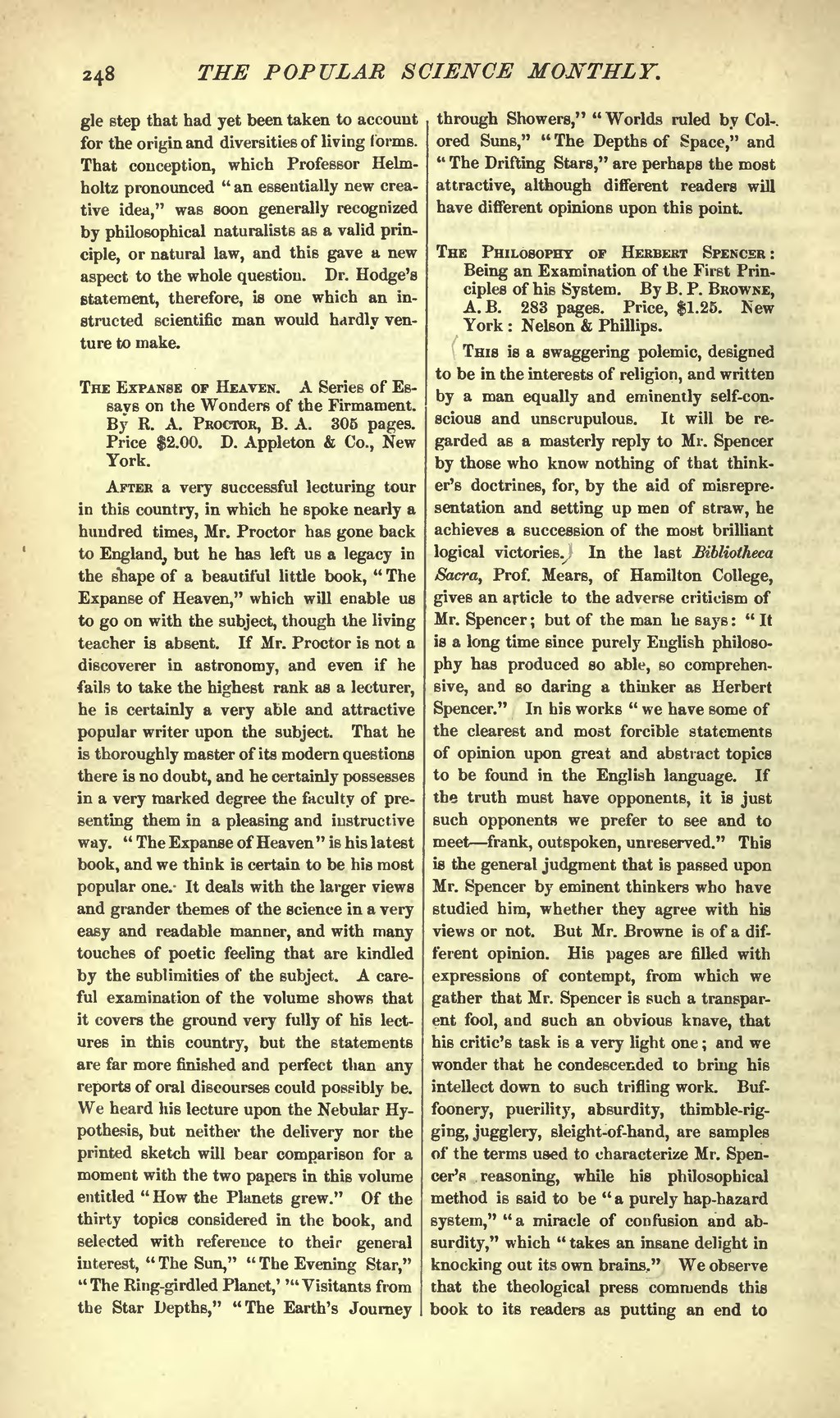gle step that had yet been taken to account for the origin and diversities of living forms. That conception, which Professor Helmholtz pronounced "an essentially new creative idea," was soon generally recognized by philosophical naturalists as a valid principle, or natural law, and this gave a new aspect to the whole question. Dr. Hodge's statement, therefore, is one which an instructed scientific man would hardly venture to make.
The Expanse of Heaven. A Series of Essays on the Wonders of the Firmament. By R. A. Proctor, B. A. 305 pages. Price $2.00. D. Appleton & Co., New York.
After a very successful lecturing tour in this country, in which he spoke nearly a hundred times, Mr. Proctor has gone back to England, but he has left us a legacy in the shape of a beautiful little book, "The Expanse of Heaven," which will enable us to go on with the subject, though the living teacher is absent. If Mr. Proctor is not a discoverer in astronomy, and even if he fails to take the highest rank as a lecturer, he is certainly a very able and attractive popular writer upon the subject. That he is thoroughly master of its modern questions there is no doubt, and he certainly possesses in a very marked degree the faculty of presenting them in a pleasing and instructive way. "The Expanse of Heaven" is his latest book, and we think is certain to be his most popular one. It deals with the larger views and grander themes of the science in a very easy and readable manner, and with many touches of poetic feeling that are kindled by the sublimities of the subject. A careful examination of the volume shows that it covers the ground very fully of his lectures in this country, but the statements are far more finished and perfect than any reports of oral discourses could possibly be. We heard his lecture upon the Nebular Hypothesis, but neither the delivery nor the printed sketch will bear comparison for a moment with the two papers in this volume entitled "How the Planets grew." Of the thirty topics considered in the book, and selected with reference to their general interest, "The Sun," "The Evening Star," "The Ring-girdled Planet," "Visitants from the Star Depths," "The Earth's Journey through Showers," "Worlds ruled by Colored Suns," "The Depths of Space," and "The Drifting Stars," are perhaps the most attractive, although different readers will have different opinions upon this point.
The Philosophy of Herbert Spencer: Being an Examination of the First Principles of his System, By B. P. Browne, A.B. 283 pages. Price, $1.25. New York: Nelson & Phillips.
This is a swaggering polemic, designed to be in the interests of religion, and written by a man equally and eminently self-conscious and unscrupulous. It will be regarded as a masterly reply to Mr. Spencer by those who know nothing of that thinker's doctrines, for, by the aid of misrepresentation and setting up men of straw, he achieves a succession of the most brilliant logical victories. In the last Bibliotheca Sacra, Prof. Mears, of Hamilton College, gives an article to the adverse criticism of Mr. Spencer; but of the man he says: "It is a long time since purely English philosophy has produced so able, so comprehensive, and so daring a thinker as Herbert Spencer." In his works "we have some of the clearest and most forcible statements of opinion upon great and abstract topics to be found in the English language. If the truth must have opponents, it is just such opponents we prefer to see and to meet—frank, outspoken, unreserved." This is the general judgment that is passed upon Mr. Spencer by eminent thinkers who have studied him, whether they agree with his views or not. But Mr. Browne is of a different opinion. His pages are filled with expressions of contempt, from which we gather that Mr. Spencer is such a transparent fool, and such an obvious knave, that his critic's task is a very light one; and we wonder that he condescended to bring his intellect down to such trifling work. Buffoonery, puerility, absurdity, thimble-rigging, jugglery, sleight-of-hand, are samples of the terms used to characterize Mr. Spencer's reasoning, while his philosophical method is said to be "a purely hap-hazard system," "a miracle of confusion and absurdity," which "takes an insane delight in knocking out its own brains." We observe that the theological press commends this book to its readers as putting an end to

